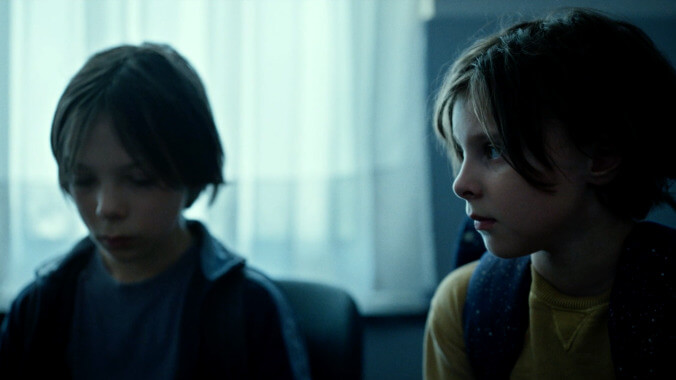The Playground is a battlefield in this harrowing drama about grade-school bullying
Matt Groening had it right after all: School is hell

Playground begins with a little drama of everyday life—one so common, you could witness it happening outside almost any school on any given morning. It’s the first day of class, and Nora (Maya Vanderbeque), a quiet, shy, nervous 7-year-old, doesn’t want to go inside. Her father (Karim Leklou), identified only as her father (the film, we will soon see, never breaks from a juvenile point of view), hugs her close. There can be no relenting to her pleas—she has to go to school, after all. But in his compassion, the plain difficulty he’s having letting go of his crying kid, lies proof that the man understands her anxiety and maybe shares it. Playground will waste little time confirming the parallel fears of father and daughter: For plenty of kids, school can be a daily gauntlet of emotional distress, perpetrated right under the noses of the guards by the other inmates of this elementary penitentiary.
Nora would like, at the very least, to stay with her brother, Abel (Günter Duret), who reassures her even before her father does. (“It’ll be okay,” he whispers, in the opening shot. “You’ll make lots of friends.”) But Abel is older and spends his days in a different classroom. It’s only at lunch and recess that the two can see each other. And here, beyond the more vigilant monitoring of adults, Abel experiences a rite of unforgiving passage: merciless, relentless bullying by his peers, who can perhaps detect the kindness and sensitivity he exhibited in that first scene and have interpreted it as a weakness. When Abel wets himself in the lunchroom shortly thereafter, his fate as a target is sealed.
Playground, which Belgium submitted for Oscar consideration (it didn’t make the cut for Best International Feature), brings a harrowing docu-realism—a sneakers-on-the-ground observational acuity—to the curriculum of dramas about what a goddamn hellscape school can be for lots of kids. It understands a reality that adults seem to forget but that children know all too well, which is that however determined looming authority figures may be to shield their young charges from harassment and cruelty, the playground is its own social ecosystem, governed by hierarchies of reputation and sadistic zero-sum games. The teachers can’t watch every kid at every moment, and they’re often too busy putting one fire out to deal with another. There are loopholes in supervision, in other words, and the bullies will always take advantage of them.
This is the stark, brisk feature debut of writer-director Laura Wandel, who takes more than a few cues from her country’s most famous, revered filmmakers: Playground is like a Dardennes brothers movie about the hardships of the schoolyard, complete with a camera that doggedly trails the pint-sized characters and a growing moral crisis for them to navigate. To align our perspective with Nora’s, Wandel keeps the frame tight, the focus shallow, and the lens close to the ground. These choices facilitate some pointed, distressing sequences, like the scene where the bullies stuff Abel into a dumpster; it’s staged with his sister watching from the foreground of the frame and his ordeal happening in the far background—an approach that emphasizes both her helpless remove from the situation and how difficult it might be for the teachers to spot these kind of occurrences from a distance.
Dramatically, as well as visually, the film unfolds from Nora’s vantage. This isn’t the story of how a beleaguered kid copes with abuse but how his younger sister processes that ongoing torment and agonizes over what to do about it. Her dilemma is heartbreakingly common. Abel insists that she say nothing about it to either the school or their father. He knows that reaching out for help might make the problem worse—in part because administrators can be truly clueless about how to intervene. (“I’m sure the four of you will be able to get along now, right?” the unseen principal concludes when the situation does finally escalate to the point of adults needing to get involved.) Playground smartly complicates the situation by showing how Nora juggles her desperate concern for her brother with a fear that his plummeting social stock might drag her into the same boat. It’s hard to watch, but Wandel doesn’t blink.
At a slender 72 minutes, Playground runs the exact same length as another recent, French-language portrait of a child sorting out a tough emotional situation, Celine Sciamma’s Petite Maman. This film is almost the scathing yin to that one’s soothing yang: no magical realism, no acknowledgement of childhood as a time of carefree merriment and adventure, just life in the war zone of pre-adolescent power struggles. It’s a dog-eat-dog world, Wandel concludes, where too many kids realize that the only way to stop being bullied is to start doing the bullying. Does that end with graduation? Notably, the siblings’ father has some light bruising around his face that’s never explained or remarked upon. Playground doesn’t need to belabor the point for us to grasp it: It’s a jungle out there, even when you leave the jungle gym behind.